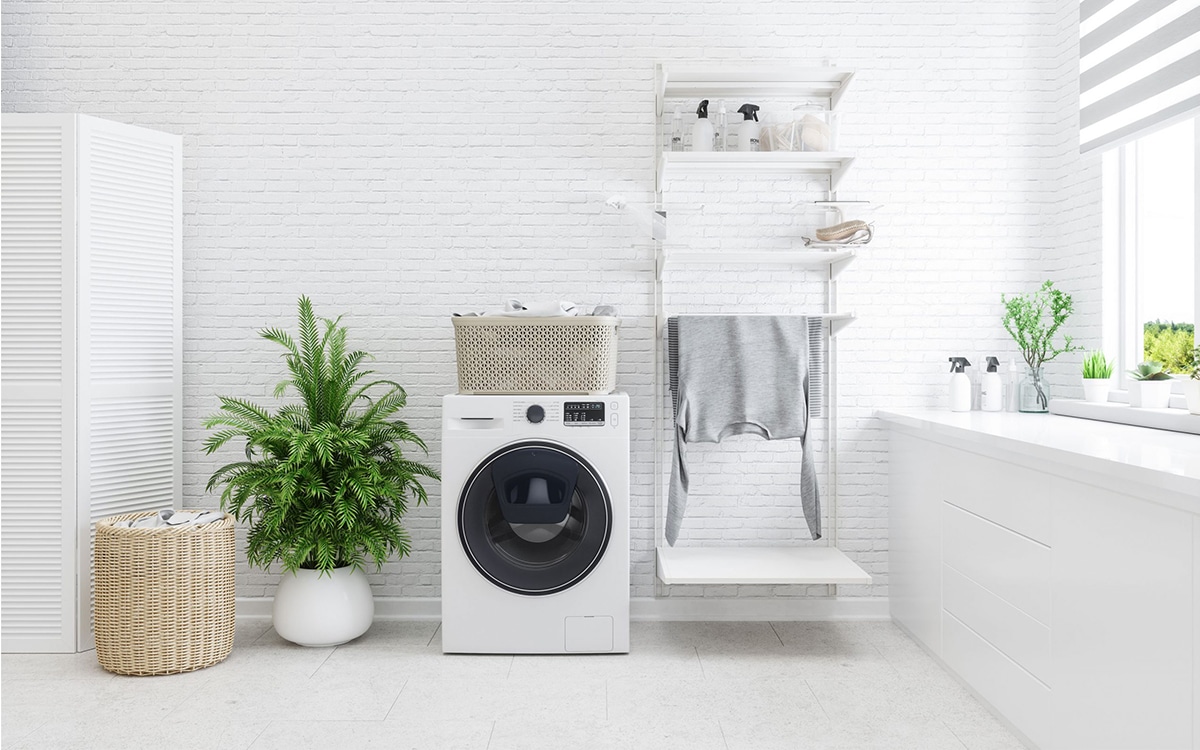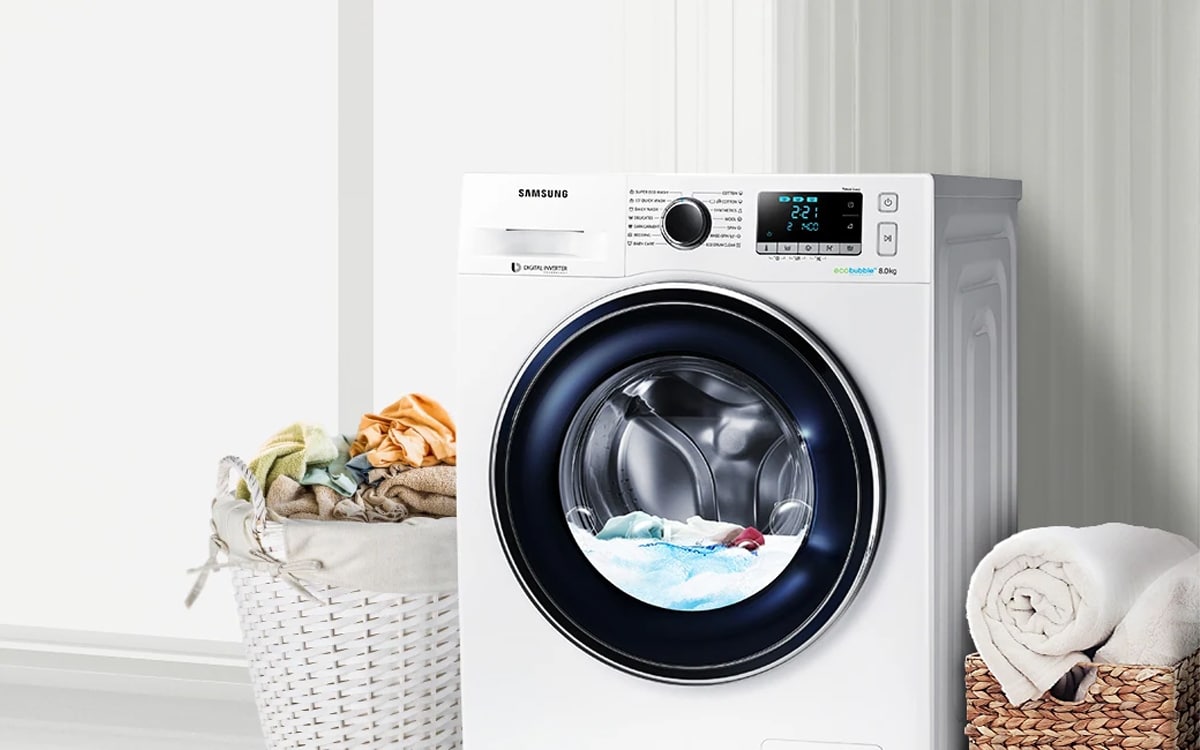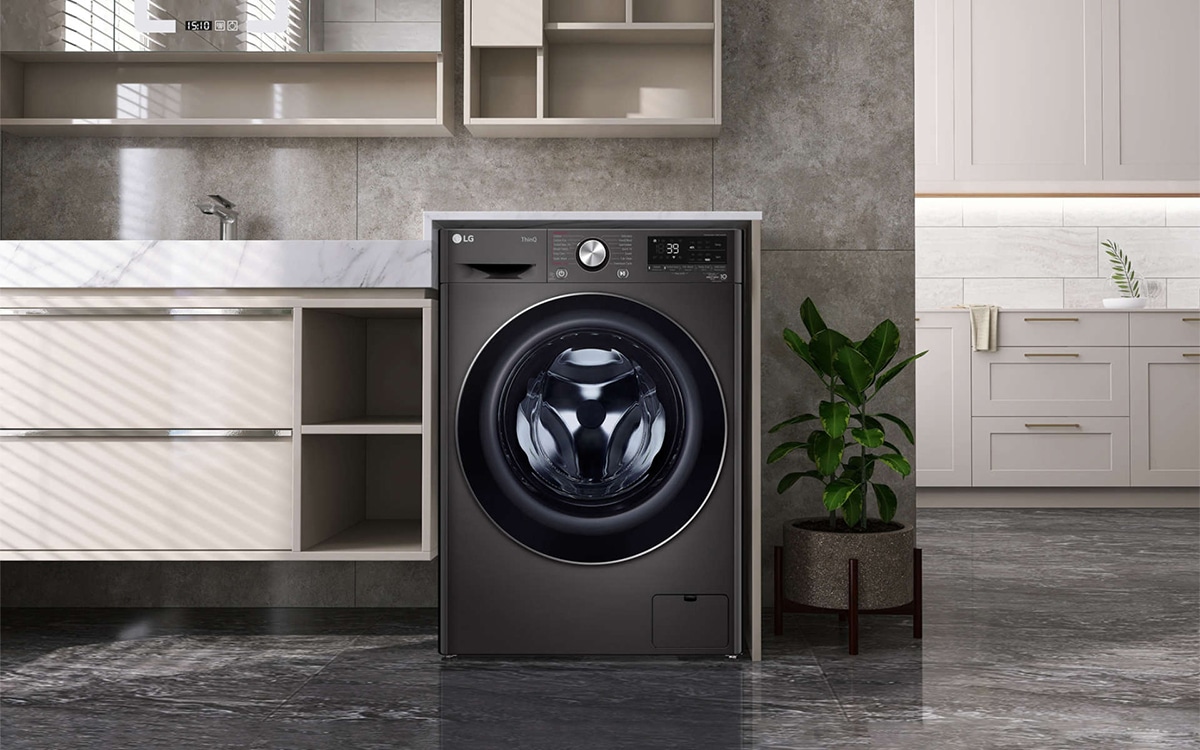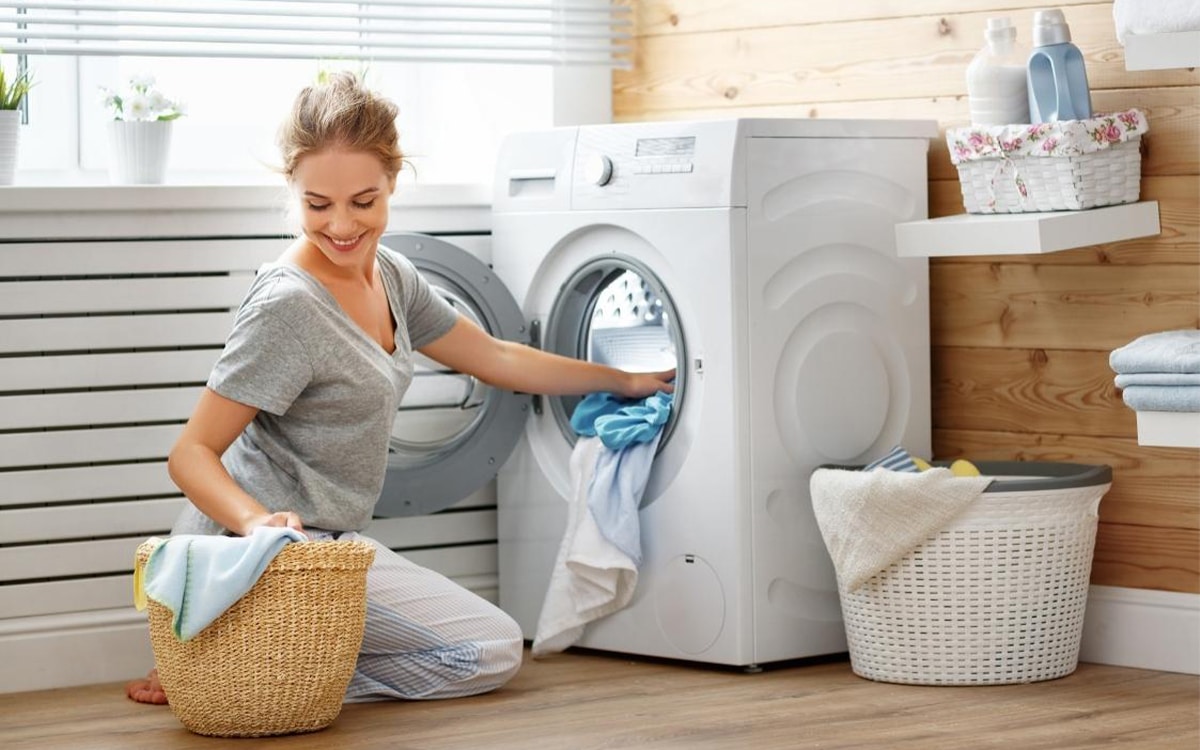Washing machines have now been in UK homes for decades, and in this time, they’ve become a truly essential part of everyday life. Tips and tricks for using washing machines now abound across the internet. The only problem is it can sometimes be tough to tell what’s fact, and what’s fiction. If only there were a definitive guide to these everyday appliances…
Whether you’re totally new to using a washing machine, or you want to understand yours a little better, this is the definitive guide you’ve been searching for! Our team of Reliant tech experts have decades of experience with washing machines. Using their expertise, we’ve set out to settle some of the hottest washing machine debates and answer all of your burning questions in this ultimate guide to washing machines. Let’s get going!
What Should You Look For In The Perfect Washing Machine?
We all know what washing machines are. After all, that’s why we’re all here right now. What’s perhaps less clear is what sets a washing machine apart from the rest. The factors that truly make a washing machine effective, and make it worth all of your hard-earned cash!
There’s plenty of choice in the modern washing machine market. But we’d recommend keeping a close measure of the following factors!
A Good Size
Washing machines vary a lot in terms of their total size. Your choice of size will generally depend on two things: how much space you have in your chosen room, and how much laundry you plan to do.
Unit Size
First off, you’re going to need to be sure that your washing machine fits through the front door. That’s the first step! Next, you’re going to need to make sure the washing machine fits into your chosen spot. You’ll want to make sure that there’s plenty of clearance for the washing machine.
You’ll want to find a washing machine that fits into your chosen room, and that has enough capacity for all of your clothes. Be sure to consider how many people will be making use of the unit!
Make sure it doesn’t protrude too much and create an obstacle that you have to wriggle past every time you move through the space. If you’re planning on putting the washing machine underneath a kitchen counter, or next to another appliance, be sure there’s enough space. This will ensure the washing machine does not vibrate during operation, creating an obnoxious noise!
Capacity
Your choice of washing machine will depend on the amount of laundry you need to do! The more laundry you need to do, the larger the capacity will need to be. For instance, if you’re doing laundry for the whole family, you’ll need a larger washing machine than someone washing just their own clothes.
Washing machine capacities can vary massively from model to model. For instance, a smaller washing machine might have a drum capacity of 7kg. This is enough for one person’s clothes. The largest washing machines can have drums upwards of 11kg, which offers enough space for a whole family!
Your choice of washing machine capacity will go hand-in-hand with your choice of unit size. In order to have a larger capacity, you will need to opt for a slightly larger model. So make sure to choose accordingly!
Picking the right capacity is crucial for making the most of your washing machine. With the right capacity, you’ll be able to cut down on the number of cycles and cut energy use. You also minimise the risk of overloading the washing machine. Overloading your washing machine puts a significant strain on the drum, which in turn can shorten the total lifespan of the unit!
A Strong Energy Rating
When you shop through some of the many home appliances on the market, you’ll inevitably come across the iconic “Energy rating” labels. Though it’s easy to glance over them, we’d recommend giving them a good look.
These labels are designed to give you a quick insight into the energy usage of any appliance. The labels contain information on how much energy the appliance uses within a set time, its total capacity, and even how much noise it makes. However, perhaps most important on the label is the colour-coded efficiency scale at the top.
We’d strongly recommend looking for an “A”-rated washing machine. It will consume far less electricity, which will have a positive impact on your monthly energy bills. They might cost more upfront, but you’ll save countless pounds!
Put simply, if an appliance is rated “A”, it’s considered to be the most efficient. If it’s rated “G”, it’s considered to be the least efficient. So, you’ll want to look for a strong energy rating. Be sure to compare and contrast these energy labels as you shop. They’ll help to make your decision even easier!
More energy-efficient washing machines are a great option. They may cost more upfront, but you have the chance to save much more in the long run.
Spin Speed
Many people are often unaware that washing machines can vary in terms of their total speed. A washing machine with a faster spin speed is able to more effectively clean and dry your clothes. The intense speeds can be used to beat dirt out of your clothes and wring them dry at the end of a cycle.
It’s worth looking for a washing machine that will allow you to easily adjust the spin speed as needed. This is because delicate clothes often need to be washed at slower speeds.
Noise
In our discussion of energy rating labels earlier, we mentioned some of the supplemental information included on them. One of these bits of information refers directly to how much noise the unit makes. We’d recommend taking the time to consider this closely.
Obviously, you’ll want to find a washing machine that creates a minimal amount of noise. Any washing machine with a decibel level of 75dB would be considered loud. On the other hand, a washing machine around 50dB is considered to be average. We’d recommend looking for decibel levels slightly lower than this.
Around 50dB is considered to be a very average noise level from a washing machine. If you want to cut down on volume, we’d recommend looking for a noise level lower!
If you’re unsure which model to opt for, we’d recommend considering what kind of room you’ll be putting the washing machine in. Planning on keeping the washing machine in a space like the kitchen, or even the garage? Then noise should not be too much of a concern. When the door’s closed, you’ll be able to ignore any amount of noise it’s making!
Price
Once you’ve narrowed your options down to just a few models, you’ll finally want to consider the price of the unit. You’ll want to consider your existing budget and the number of features you want from your washing machine. The more features, and the greater the washing machine’s size, the more you’ll have to spend. Be sure to weigh the two up so you can settle on a unit that suits your needs.
You don’t want to spend too little or too much. Otherwise, you’ll either end up with a washing machine that doesn’t meet your needs or has a bunch of features you’ll never use!
Should You Go For A Freestanding Or Integrated Washing Machine?
As part of buying a new washing machine, you’ll need to find a place to put it. At this point, you’d need to consider whether to go for a freestanding model or an integrated model.
A freestanding washing machine is one that can be placed anywhere in your kitchen, as it, obviously, stands on its own feet. This is a great option for anyone who wants a simple washing machine that they can quickly place in a chosen spot. Regardless, a freestanding washing machine will still need to be placed with access to water and power!
Freestanding washing machines are unlimited in terms of size, shape and design, so you can pick one that easily suits the look of your chosen space.
An integrated washing machine, on the other hand, is actually built directly into the design of your kitchen. Most often, they’re hidden behind cabinet doors. These versions are great for those who want to create a modern and minimalist look for their kitchen.
A freestanding washing machine can be placed anywhere. An integrated model, on the other hand, is built directly into the kitchen, to match the overall design. They involve a little more planning!
However, because integrated washing machines are included as part of the design of the kitchen, it involves a lot more planning to find the perfect spot, and the perfect model. Your options will be a little more limited when it comes to which model you opt for, as it will need to fit a certain size!
Integrated washing machines look amazing, and are non-intrusive, but they involve a little more careful planning!
Which Washing Machine Brand Is The Best?
This question gets asked a lot! Because of just how many different washing machine brands and models there are, many people try to make sense of it all by asking which is the best.
Unfortunately, the answer just isn’t that simple. Each of the leading brands, from LG to Samsung and Bosch, offer very different user experiences. Each of the different brands has its own unique technologies and trademarks that make their washing machines worth considering.
When looking for a washing machine, instead of asking “Which brand is the best?”, you should instead ask yourself what features you are looking for. This way, you’ll be able to more easily find a suitable model that meets your own unique needs.
However, if you’re looking for truly affordable washing machines, then we would recommend looking at the models offered by LG. LG offers truly fantastic and durable washing machines that won’t cost you the earth just to buy!

Can You Install A Washing Machine By Yourself?
Technically speaking, it is possible to install a washing machine alone. However, in order to do this, not only will you need good form, but you will also need the right knowledge.
First, we have to mention that washing machines are very heavy. Without good upper body strength and good form, you can very easily injure yourself trying to push it into place. If you find that your washing machine is a little too heavy, we’d recommend contacting a friend to help you move it into place.
We’d recommend contacting an electrician and plumber to help with installing your washing machine. They’ll make sure it’s hooked up fully, so you can use it with confidence, and count on it for years to come.
If you are moving your washing machine into a spot that has previously housed a washing machine, and you understand how to hook it up to your electricity and water supply, then it can safely be done alone. However, if you are moving your washing machine into a new spot, or you simply don’t have much knowledge about plumbing or electronics, we would recommend contacting both a plumber and electrician to ensure your washing machine is installed fully and safely!
How Long Can You Leave Clothes In A Washing Machine?
No matter whether a cycle has just finished, or you’re loading your washing machine ahead of a cycle, you should try not to leave your clothes in the drum for more than 12 hours. The reason is that leaving your clothes in the washing machine, in any state, can leave them very vulnerable to bacteria and mould.
Leaving dirty clothes in the washing machine ahead of washing can be particularly troublesome. When clothes are dirty, they’re naturally riddled with bacteria that can spread all over. Leaving your dirty clothes bundled up in the warm conditions of the washing machine drum can allow that bacteria to easily spread and propagate!
And when your washing machine has finished its cycle, it’s important to get your laundry out within the 12-hour time frame. This is because, after a washing cycle has finished, the drum is very moist and warm. Unfortunately, warm and moist environments are preferred by bacteria and mould. This means, leaving your clothes lying around in there leaves them highly vulnerable!
As soon as your washing machine has finished its washing cycle, we recommend removing your clothes as soon as you can. If you do accidentally leave your clothes in the washing machine after washing, just give them another quick wash to kill away any new bacteria.
How Much Electricity Does A Washing Machine Use?
Despite outward appearances, washing machines don’t actually consume a massive amount of electricity. In fact, the average wash only uses around 0.8 kWh. This equates to around 20 pence for every cycle you run.
This is why it’s important to make full use of your washing machine’s capacity. Half-filling your washing machine will require you to run more cycles, in turn leading to much higher energy consumption.
Do Washing Machines Cost A Lot To Use?
This will ultimately depend on how often you run your washing machine. The more times you use your washing machine, the more it will cost you every year. As such, a great way to cut down on energy use and cost is to run fewer washing cycles. If you’re often having to run multiple cycles just to keep up with your family’s laundry needs, then we’d recommend grabbing a larger model. This way, you can save electricity, and get everything done at a much faster rate!
The efficiency of your washing machine will also have a direct impact on operating costs. The more efficient your washing machine is, the less electricity it will use. Significantly reducing your energy bills as a result!
On average, a washing machine can easily cost £30 to £50 every year to run. This, of course, will depend on how often you use the washing machine, and how efficient it is.
Does It Cost Less To Wash Your Clothes By Hand?
For washing machine users and washing machine newbies alike, it’s common to wonder whether it would be cheaper to do it all by hand. In fact, it’s really easy to assume that washing your clothes by hand, item by item, is much cheaper. But this isn’t always the case.
On the technical level, washing your clothes by hand uses much less water. If you were to wash dishes by hand, you’d only need a simple basin of water and some detergent. This same water can then be used to clean a massive number of clothes at once without needing any new water. A washing machine, however, needs to consistently cycle new water into the drum to keep everything clean.
Though washing your clothes by hand may use less water than a washing machine, it instead uses much more electricity. In order to provide a full and sanitary clean, you’ll need access to hot water. The electricity needed to heat up your water will likely be more than the electricity needed to power your washing machine!
Washing your clothes by hand isn’t all that cost-effective. It might use less water, but it actually uses more electricity. It also takes a very long time, and you’ll be slaving away at the sink!
As such, it’s not actually that cost-effective to wash your clothes by hand, rather than through your washing machine. And after all, washing your clothes by hand is a long and laborious process. By using a washing machine, you can free up countless hours to focus on what really matters to you!
Does It Cost Less To Run A Washing Machine At Night?
It’s long been rumoured that it costs less to run your washing machine at night. Luckily, we can confirm that there is some truth to the rumour! In fact, using any electrical appliance at night will cost slightly less.
From 11 PM onward, electricity costs are significantly reduced thanks to the fact that most people are asleep! When everyone is asleep, fewer electrical appliances are being used. This significantly reduces the demand placed on the power grid.
The reduced overnight electricity costs pass at around 7 AM the next day. As such, if you set your washing machine to run while you’re asleep, it will cost much less.
However, this will require some planning. This is because you shouldn’t leave your freshly washed laundry lying about in the drum for more than 12 hours. As such, you’ll want to make sure to empty it as soon as you wake up in the morning.
However, this may not be an effective cost-cutting measure for those in smaller homes. While it costs less to run a washing machine at night, it will still produce the same amount of noise. Could you imagine anything worse than listening to your washing machine drone on while you try to drift off? If your washing machine is in close proximity to any bedroom, it’s best not to run it during the night.
We would suggest that you exercise caution leaving your washing machine running overnight. If your washing machine is prone to overheating, or is not effectively hooked up to your local power supply, then it may pose a small fire risk.

How Can You Reduce The Energy Consumption Of A Washing Machine?
It’s much more effective to use a washing machine than to task yourself with washing your laundry by hand. But if you’re worried that too much power is being used by your washing machine, don’t worry! There are quite a few things you can do to reduce the energy consumption of any washing machine!
Use Eco Wash
Much like dishwashers, many washing machines actually come with a special eco-wash cycle programmed into them. This cycle, as the name suggests, is programmed to use less water, and to reduce energy consumption!
Eco-wash is a cycle that makes more economic use of water and electricity. By reducing the temperature of the water, the electricity usage is cut down by around half! The cycle might take longer, but it’s worth it!
A regular washing cycle uses up a lot of energy in heating up the water before washing. What makes eco-wash so effective is that it shortens the water heating process. This results in much cooler water.
Many people initially baulk at the idea of performing an eco-wash cycle, thanks to the fact that it takes around 3 hours to complete! But why exactly is this?
Why Does Eco Wash Take 3 Hours To Finish?
The main reason eco-wash takes so long is that it takes longer for the cooler water to do the job. Hot water is incredibly effective at killing bacteria, and cleaning your clothes. In fact, the high temperatures make the process incredibly fast. Because eco-wash uses much cooler water, it needs to take much more time to do an effective job.
It may initially seem quite annoying to have to wait around for your washing machine to finish an eco-wash cycle, but it’s worth it. It will reduce your energy consumption, and yet will still result in a full and effective clean.
Fill It Up!
It might sound obvious, but it’s very easy to forget just how important it is to make full use of your washing machine’s drum capacity. Half-filling your washing machine would result in a significant amount of water and electricity being wasted. The same amount of water used to wash a half load could be used to wash a full load. If you’re prone to underfilling your washing machine, we’d recommend grabbing a model with a load sensor. This allows the washing machine to detect how much laundry is inserted, and adjust the cycle accordingly!
Underfilling a washing machine can also be dangerous for some models! With too little weight holding the drum down, it can place significant strain on the motor that keeps the drum spinning. This could cause the drum to misalign, which could also significantly shorten the washing machine’s lifespan.
You should make sure to never underfill or overfill your washing machine. It can put a significant strain on the drum’s motor, which would then have a direct impact on how the washing machine spins!
To check you’re not overfilling your washing machine, you should check that you can still fit your hand into the drum, above the laundry. If not, you run the risk of damaging the washing machine by overloading it!
Lower The Water Temperature And Spin Speed
As we’ve already noted, much of the energy used by a washing machine is dedicated to heating up the water. As well as this, energy is also dedicated to spinning the drum. A great way to reduce overall energy consumption is to lower the water temperature and the speed at which the drum spins.
This is similar to using eco-wash but allows you to tailor the washing experience to your needs. This makes it a great option for anyone on a busy schedule, especially for washing items that may require specific washing conditions.
Upgrade!
If all other options fail, or your washing machine is more than 10 years old, we’d recommend upgrading to a new model. As we’ve highlighted before, newer washing machines are much more optimised than their older counterparts. Thus, they use much less electricity and still deliver better results.
If your washing machine is reaching the end of its life, it’s worth replacing it. You might have to spend a little more upfront to grab the new unit, but it will save you a lot of money in the long run!
What Is The Average Lifespan Of A Washing Machine?
We spoke a little just above about replacing an older washing machine. However, you might wonder at what point it’s necessary to replace a washing machine. To find this out, it’s good to know the average lifespan of a washing machine.
On average, washing machines tend to last around 10 to 12 years. Of course, this is a very healthy age! But in order for your washing machine to live this long, you’ll need to take very good care of it.
At around 5 to 6 years, most washing machines will show their first faults. The severity of these faults can vary massively from case to case. Whether or not you replace your washing machine will depend on how severe the issue is, and how much it would cost to repair.
If it would cost more to repair an older washing machine, than to buy a new one, it’s best to simply take the leap and go for a complete replacement.
If your washing machine is much younger, and its faults are only minor, then it might be worth opting for some repairs. At a younger age, it’s much less likely that new issues will arise!

Frequently Asked Questions
What Makes A Good Washing Machine?
A good washing machine is able to provide you with a full and effective clean while also cutting down on the amount of electricity used. Your dream washing machine should also have a good capacity and should fit comfortably into your home. If you need to wash a family’s worth of laundry, you’ll need a larger washing machine.
Are More Expensive Washing Machines Better?
More expensive washing machines most often have their higher price tags as a result of different features. For instance, the larger a washing machine is, the more it will cost. This also applies to how efficient the model is. More efficient models tend to cost much more. Whether or not a more expensive washing machine is worth it will depend on what you want from it.







0 Comments